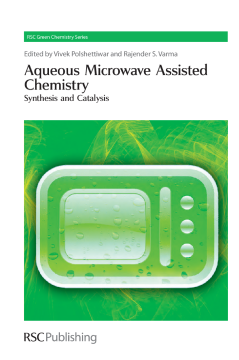
Additional Information
Book Details
Abstract
The demands for green and sustainable synthetic methods in the fields of healthcare and fine chemicals, combined with the pressure to produce these substances expeditiously and in an environmentally benign fashion, pose significant challenges to the synthetic chemical community. Green chemistry can avoid pollution by utilizing techniques that are environmentally friendly by design and one of the best green techniques is the use of microwave (MW) assisted aqueous synthetic protocols. Fusing MW technique with water (as a benign reaction medium) can offer an extraordinary synergistic effect with greater potential than these two individual components in isolation. Selective microwave heating can be exploited to develop a high yield protocol and the use of water expedites the MW-protocol with more energy efficiency. This book provides an overview of the various processes developed using aqueous microwave chemistry and is written for chemists, chemical engineers and researchers in the early stages who want to develop sustainable and green processes. Written by well known microwave experts, the book is a comprehensive examination of the field and is the first book that deals strictly with aqueous microwave chemistry and represents a significant effort towards green chemistry. It covers all the microwave-assisted aqueous reactions in depth, including heterocycle synthesis, metal catalysis, enzyme catalysis, polymer synthesis, nanomaterials synthesis and nano-catalysis. Each chapter contains representative experimental procedures, helping the reader quickly replicate some of the experiments to gain hands-on experience.
The title book is the 7th in the RSC Green Chemistry Series that combines two green chemical disciplines, microwave (MW)-assisted reactions and the use of water as a medium for organic reactions. Thus, the selection covers a really hot topic in environmentally-friendly chemistry...The book, written by MW experts in actual hot topics, is suggested to chemists, biochemists, chemical engineers and researchers including also PhD-, graduate- and undergraduate students.esearchers including also PhD-, graduate- and undergraduate students.
Dr Gyorgy Keglevich, Budapest University of Technology and Economics
Dr Vivek Polshettiwar was born in Mangli (India) in 1979. He obtained his Ph.D. (2005) under the supervision of Prof. M. P. Kaushik from Jiwaji University and DRDE, Gwalior. He investigated nanostructured silica-catalysis, with Prof. J. J. E. Moreau and Prof. P. Hesemann in 2006 during his postdoctoral research at ENSCM, Montpellier (France). He also worked as project leader in Jubilant Chemsys, Noida for short time.. Then he moved to the U. S. Environmental Protection Agency (2007-2009) to research nano-catalysis and MW-assisted new synthetic methods for green chemistry with Prof. R. S. Varma. Currently, he is working as senior research scientist at KAUST catalysis center directed by Prof. J. M. Basset. His research interests are in the area of advanced nano-materials for perfect catalysis. He has over 50 publications including various review articles and book chapters. Prof. Rajender S. Varma was born in India (Ph.D., Delhi University 1976). After postdoctoral research at Robert Robinson Laboratories, Liverpool, UK, he was a faculty member at Baylor College of Medicine and Sam Houston State University prior to joining the US Environmental Protection Agency in 1999. He has over 35 years of research experience in management of multi-disciplinary programs that include nanomaterials and development of environmentally friendlier alternatives for synthetic methods using microwaves, and ultrasound etc. He has published over 300 scientific papers and has been awarded 6 US Patents.
